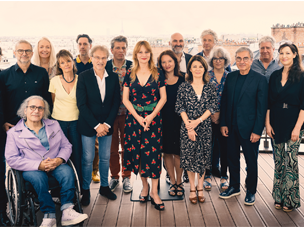Jean-Noël Tronc, Chief Executive Officer of Sacem & Christian Ehler, Member of the European Parliament
Questions for Jean-Noël Tronc, Chief Executive Officer of Sacem:
Why did it seem so important to address the subject of culture in Europe in your book "Et si on recommençait par la culture ?" ?
It is vitally important to spread the word: if we do not change the image of culture, we cannot change the course of history. When we approach talking about culture in the right way, our message is heard: Andrus Ansip, the Commissioner with whom we had a difficult hearing in 2014, changed his mind when we started to explain ourselves to him. This made it possible to get the draft copyright directive back on track.
In your book, you talk at length about the essential nature of collective management: why is it still so necessary?
Authors’rights is the keystone of funding for the cultural industries. It is an instrument of freedom of which we should be proud. Collective management still seems to be an esoteric subject to some: it bears repeating that it is the perfect illustration of the motto "Unity makes strength". Collective management organisations provide vital services to their members and also serve the needs of users. Streaming services could never negotiate a licence agreement with each of the 160,000 members of Sacem, for their one hundred million works.
Which cultural policy measure would you recommend that European institutions adopt first?
I would press the next President of the European Commission to make the strengthening of the European cultural sector one of the main priorities of their mandate, with one simple objective: to increase the number of jobs from seven million to ten million. The future president of the Commission should make the battle for culture a battle for creative employment
Questions for Christian Ehler, Member of The European Parliament:
What do you think has been the main success of the Industries culturelles et créatives (ICC) [cultural and creative industries] intergroup which you set up with Pervenche Berès in 2015?
Our most notable success has been placing the creative and cultural industries at the heart of the political agenda in Brussels. Very early on, all the MEPs involved realised that the creative industries were at the heart of the European economy. They are highly skilled as regards creativity and talent, they generate immense amounts of economic wealth and they preserve European identity, culture, and values. In an initiative report published in 2016, we put forward a vision which would help to foster growth, unlock the sector's innovative potential and ensure a balanced legal framework is in place for creators, their partners and consumers. Another milestone was reached last month. For the first time ever, research efforts in the creative sector are being promoted by a business cluster dedicated to research and innovation in the fields of cultural heritage and creativity!
How did the intergroup influence the proposal to increase the culture budget in the European Union?
This was done through internal discussions, as well as through events organised by the intergroup, such as conferences and stakeholder consultations. Thanks to members of the intergroup, who sit on various parliamentary committees such as Culture, Industry, Consumer or Legal Affairs, the cultural and creative industries have become a priority in all the relevant European funding programmes, such as InvestEU, Creative Europe and Horizon Europe.
Do you intend to continue your work in the ICC intergroup?
Yes. In particular, we still need to keep a close eye on budget negotiations and ensure that the cultural and creative industries receive adequate funding within each programme and across the budget as a whole. We will continue to work through alliances between political parties and parliamentary committees to address future challenges such as digital regulation, artificial intelligence, youth employment, education and innovation and research.
For more information about the Directive
Published September 26 2019


